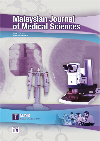
|
Malaysian Journal of Medical Sciences
School of Medical Sciences, Universiti Sains Malaysia
ISSN: 1394-195X
Vol. 24, No. 1, 2016, pp. 81-93
|
 Bioline Code: mj17009
Bioline Code: mj17009
Full paper language: English
Document type: Research Article
Document available free of charge
|
|
|
Malaysian Journal of Medical Sciences, Vol. 24, No. 1, 2016, pp. 81-93
| en |
Perceived Stress and Coping Styles among Malay Caregivers of Children with Learning Disabilities in Kelantan
Isa, Siti Nor Ismalina; Ishak, Ismarulyusda; Ab Rahman, Azriani; Mohd Saat, Nur Zakiah; Che Din, Normah; Lubis, Syarif Husin & Mohd Ismail, Muhammad Faiz
Abstract
Background: Caregivers of children with learning disabilities have been shown to
experience increased stress and greater negative caregiving consequences than those with
typically developing children. There remains a lack of studies focusing on stress and coping
mechanisms among caregivers of a wider age group and diagnosis of individuals with disabilities
in Asian countries. The current study examines levels of perceived stress and associated child
and caregiver factors among caregivers of children with learning disabilities in the Malaysian
context. An additional aim was to determine whether caregiver coping styles may be predictors of
perceived stress.
Methods: The Malay version of the Perceived Stress Scale with 10 items and the
Brief COPE Scale were administered to a sample of 190 Malay caregivers of children with learning
disabilities registered with community-based rehabilitation centres in Kelantan, a state in
Peninsular Malaysia. Multiple linear regression analysis was applied to determine the predictors
of perceived stress.
Results: The mean total perceived stress score of caregivers was 16.96 (SD
= 4.66). The most frequently used coping styles found among caregivers included religion,
acceptance and positive reframing, while substance use and behavioural disengagement were
least frequently used. Higher perceived stress was significantly predicted among caregivers with
fewer children, frequent use of instrumental support and behavioural disengagement coping, and
lack of emotional support and religious coping.
Conclusion: Findings indicate that the perceived
stress levels among caregivers were significantly predicted by different coping styles. It is vital to
help the caregivers improve their good coping styles in order to reduce their stress levels.
Keywords
stress; coping styles; parents; caregivers; children; disabilities
|
| |
© Copyright 2017 - Penerbit Universiti Sains Malaysia
Alternative site location: http://www.medic.usm.my/publication/mjms/
|
|
